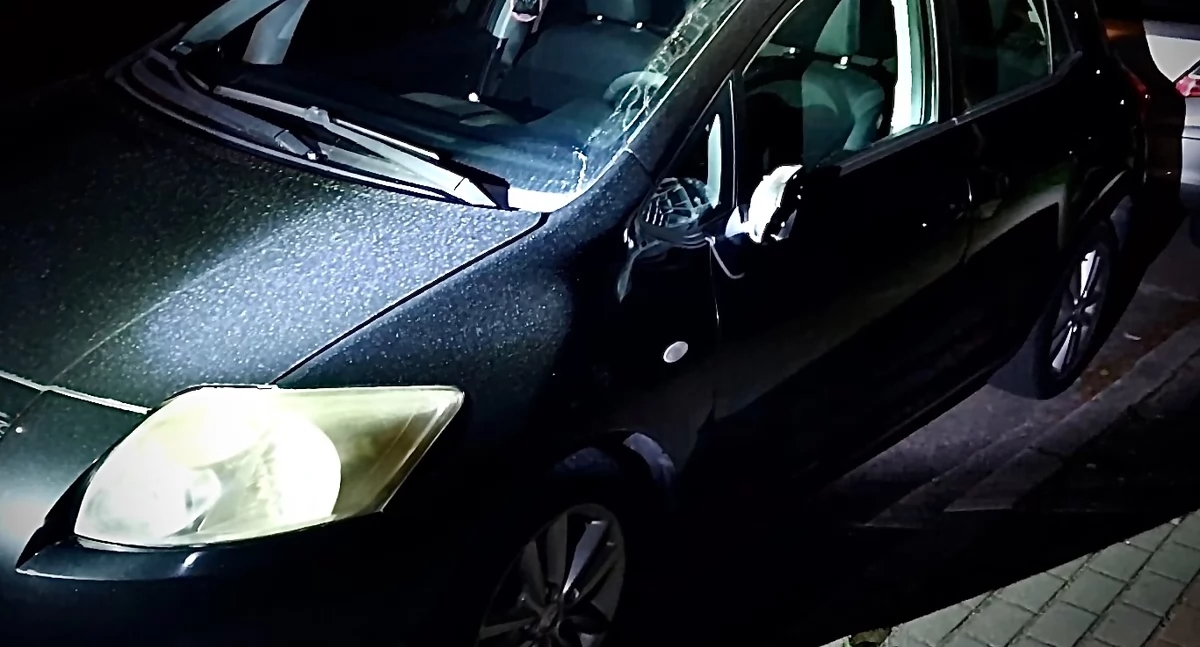Description of the facts
M. W. has been blamed for infringements of Article 54, Article 431 Paragraph 1 of the Law of 26.10.1982 on Sobriety Education and Anti-Addicting of Alcoholism (Journal of Laws of 2023 item 2151; hereinafter: AlkU), Art. 141 KW, Art. 65a KW and Art. 65 §2 KW.
District Court of R. by order of 13.7.2020, II W 354/20, assuming on the basis of the evidence gathered that the circumstances of the act and the wine blamed are not of uncertainty to the suspect M. W. for committing alleged offences, he assumed that the act had exhausted the disposition of Article 54 of the Code in § 18(1)(2) of the Regulation of the Council of Ministers of 19.4.2020 on the establishment of certain restrictions, orders and prohibitions in connection with the occurrence of an outbreak (Journal of Laws of 2020 item 697; hereinafter: OgrEpidemiR20(3)) and on the basis of Article 65a of the Decree of the Law of 19.4.2020 in § 9(2) of the Code of Procedure, he imposed a full punishment of PLN 800.
This judgement was not contested by the parties to the proceedings and was finalized on 20.8.2020.
The cassation in favour of the accused, in full appealing the judgment, was brought by the Ombudsman, who accused the gross and material law infringement, i.e. Article 54 KW in conjunction with Paragraph 18(1) of the OgrEpidemiaR20(3).
In its conclusions, the applicant requested the annulment of the order judgement of the territory Court in R. in its entirety.
The ultimate Court, after proceeding the Ombudsman’s cassation in favour, repealed the judgement of the Radomsk territory Court in its entirety and acquitted M. W. from committing acts of Article 54 of the Code and Article 65a of the Code, and on acts of Article 431 Paragraph 1 of the AlkU, Article 141 KW and Article 65(2) KW have waived proceedings on grounds of statute of limitations.
Reasons for SN
According to the ultimate Court, the cassation brought by the Ombudsman proved to be justified, which allowed it to be included in the gathering under Article 535(5) of the NCP.
Pursuant to Article 54 KW, who goes against the regulations issued under the law on the conduct in public places, is liable to a fine of up to PLN 500 or reprimand. The construction of this provision is of a blank character, i.e. the provision itself does not specify in a comprehensive manner the characteristics of the prohibited conduct, but refers to another provisions which regulate the principles and manner of conduct in public places (the Constitutional Court ruling of 8.7.2003, P 10/02/Legalis). As stated by the Constitutional Court with respect to the requirements relating to the application of Article 54 of the General Court, ‘The courts, applying this provision, should always examine whether the governing body acted under the law and within the limits of statutory authorisations. punishment under Article 54 KW is only possible if the breached rules do not go beyond the limits of the statutory mandate. The courts, applying Article 54 of the General Courts, are besides required to examine whether the order rules to which the regulation in question refers are compatible with the Constitution of the Republic of Poland, and in peculiar whether they have been established in accordance with the constitutional rules governing the provision of basic acts.’
In the case at hand M. W. An infringement of Article 54 of the Code in conjunction with Paragraph 18(1)(2) of the OgrEpidemiiR20(3) has been attributed.
In assessing, from the point of view of the above criteria, the provisions of the Act of 5.12.2008 on the prevention and eradication of infections and infectious diseases in humans (Journal of Laws of 2024 item 924; hereinafter: ZapobChorobiju), i.e. Articles 46a and 46b items 1-6 and 8-12 Zaporobiju, which did not authorize the Council of Ministers to impose an order for the covering of mouth and noses of persons residing in public places, should be noted.
Maintenance M. W. did not comply with the infringement criteria of Article 54 of the Code.
M. W. he was besides found guilty of committing an offence under Article 65a of the Rules of Procedure. The mark of this offence is, among another things, that the effect of not following orders from a police officer is to prevent or importantly impede his performance of his duties. However, as is clear from the description of the act attributed in that respect to the defendant, the territory Court did not take that uncovering and did not reflect it in that description. In this context, the M. W. there was no anticipation of attributing the offence to him.
The territory Court, erstwhile issuing the judgment, referred to Article 93(1) and (2) of the CSC, claiming that it does so assuming, on the basis of the evidence gathered, that the circumstances of the act and of the wine blamed are no doubt.
The provision of Article 93(2) of the CPR provides that a judgement in order proceedings may take place if the circumstances of the action and of the blame are not in doubt. Therefore, it will only be possible to settle at a sitting without the participation of the parties if this deficiency of uncertainty is based on the evidence gathered.
This was not fulfilled in the present case, as indicated by the following circumstances. According to an authoritative note drawn up by a police officer, M. W. during intervention despite the work to supply individual data, he refused to supply them. A second police officer interviewed as a witness testified that M. W. during the intervention: ‘He did not want to supply his individual data as well as his place of residence. The man declared that he would not give the data without giving the reason why he would not. After a while, however, he gave the data.” Contrary to the position of the territory Court, the facts of the action and of the blame are so in doubt, and in the light of these circumstances, the case had to be brought to trial in order to carry out the evidence and to explain all applicable facts. In this state of affairs, in the light of the evidence indicated in the application for punishment, it was not possible to conclude, without direct evidence, that the circumstances of the act and of the guilty were not in doubt. The territory Court of R. so grossly infringed Article 93(2) of the CSC, which could at the same time have a crucial impact on the content of the judgment, since it cannot be ruled out that, after the hearing, a different decision would have been taken.
It must be pointed out for the applicant that the territory Court of the Court of First Instance in the contested judgement imposed a fine of PLN 800 for the 5 offences attributed to it within the limits of the threat laid down in the provision providing for the strictest penalty. Thus, the fine in question is the only fine to be fined for respective offences, and so for each of them. This means that the repeal of a judgement on 1 of the offences attributed is applicable to the full punishment ruling, since that ruling contains an ailment relating to all assigned behaviours.
In the circumstances of the present case, the repeal of the judgement and the acquittal of the guilty individual against the act of Article 54 of the General Court, cited in paragraph 18(1)(2) of the OgrEpidemiiR20(3) and of the act of Article 65a of the General Court and the repeal of the judgment, consequence in the elimination of the essential decisions from the legal market.
All actions abandoned M. W., were to be committed on 25.4.2020. In accordance with Article 45(1) of the Code, the criminality of the offence shall cease if a year has elapsed since the offence has been committed; if a proceeding has been initiated during that period, the criminality of the offence shall cease within 2 years of the end of that period. The pre-criminalities of these acts were so 25.4.2023.
Comment
The background of the case being examined until it asks for the callback of Article 41(1) of the Constitution of the Republic of Poland, which states that everyone is granted individual freedom. In addition, this protection is reinforced by the wording of Article 31(3) of the Constitution of the Republic of Poland, which shows that restrictions on the exercise of constitutional freedoms and rights can only be established in law and only if they are essential in a democratic state for its safety or public order, or for the protection of the environment, wellness and public morality, or for the freedom and rights of another persons. There is no uncertainty that Paragraph 18(1)(2) of the OgrEpidemiiR20(3) of the Act of Law of lower rank than the Law did not so fulfil the first of these conditions. In this situation, the said regulation infringes the provisions of Article 31(1) and (3) of the Constitution of the Republic of Poland, which in turn entitles to the claim that it could not be the origin of obligations for citizens and so the basis for the punishment for failure to comply with the obligations expressed in it, due to the fact that it could not make a legal basis to fulfil the scope of the standard sanctioned by Article 54 of the Code and supply the basis for the liability for this offence.
Judgment of the ultimate Court of 18.12.2024, V KK 528/24, Legalis









![Runęła ściana kamienicy w Wielkopolsce. W budynku przebywała starsza kobieta [ZDJĘCIA]](https://storage.googleapis.com/poludniowaoficyna-pbem/zwielkopolski24/articles/image/d848a2a9-2140-417b-8ff8-4cb559420e6a)






